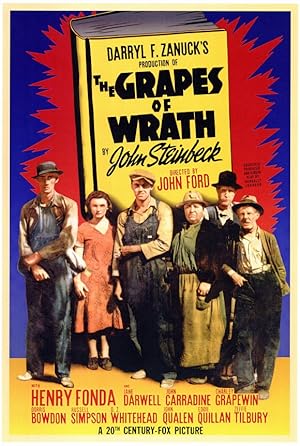The Grapes of Wrath
| 1940Directed by: John Ford
Main Plot
The Grapes of Wrath follows the Joad family as they navigate the hardships of the Great Depression and the Dust Bowl in the 1930s. After being displaced from their Oklahoma farm due to economic struggles and environmental devastation, the Joads embark on a treacherous journey to California in search of work and a better life. Along the way, they encounter numerous challenges, including poverty, discrimination, and the harsh realities of migrant life. The family faces the struggle for survival while grappling with the loss of their home and the hope for a brighter future. As they travel, they meet other displaced families and form a sense of community, highlighting the resilience of the human spirit amidst adversity. The film paints a poignant picture of the struggles faced by many during this era, emphasizing themes of social injustice and the quest for dignity.
Characters
- Henry Fonda plays Tom Joad, a parolee who leads his impoverished family westward in search of a better life during the Great Depression.
- Jane Darwell played Ma Joad, the resilient matriarch who holds her family together during their migration from Oklahoma to California during the Great Depression.
- John Carradine plays Jim Casy, a former preacher who inspires and leads labor protests, significantly impacting the protagonist's family and their journey.
Ending Explained
In the ending of The Grapes of Wrath, the Joad family faces the harsh realities of their struggle for survival during the Great Depression. After being forced off their land and enduring a grueling journey to California, they arrive only to find that the promised opportunities are scarce and the conditions are dire. The family is fragmented, with some members lost along the way, highlighting the devastating impact of economic hardship. The climax occurs when Tom Joad, having been involved in a confrontation that leads to violence, decides to leave his family to protect them from potential repercussions. His departure symbolizes the sacrifices made in the fight for dignity and survival. Ma Joad, embodying resilience, encourages the family to stick together despite the overwhelming odds. The film concludes with a poignant scene where the family takes refuge in a barn during a flood. Here, they encounter a woman and her starving child, prompting an emotional response from Ma Joad. This moment encapsulates the film's themes of compassion and solidarity amidst suffering. The ending emphasizes the ongoing struggle for hope and humanity, suggesting that even in despair, the spirit of community and empathy can endure.
